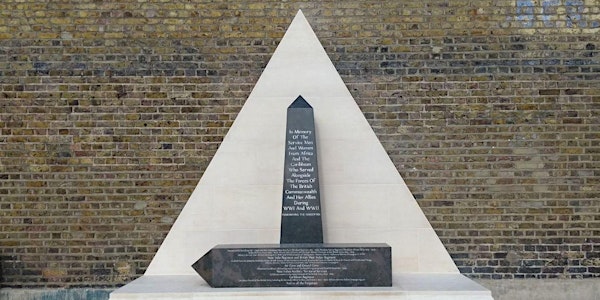
DARK-SKINNED PEOPLE SPIRIT PARTY-BREAKING THE CURSE OF HAM FOR REPARATIONS
Summoning the Black Spirits of Reparatory Justice: A Call to ADEJA at the African and Caribbean War Memorial
Location
Black Caribbean African War Memorial Windrush Square
Effra Road London SW2 1JQ United KingdomAbout this event
Summoning the Black Spirits of Reparatory Justice: A Call to ADEJA at the African and Caribbean War Memorial
In the heart of Brixton, London, stands a monument that echoes the stories of valor, sacrifice, and resilience – the African and Caribbean War Memorial. Unveiled on June 22, 2017, this memorial pays homage to the more than two million African and Caribbean servicemen and women who fought alongside British and Commonwealth Forces in the First and Second World Wars. It is a testament to the historical contributions of Black and minority ethnic people in Britain, a history often neglected or overlooked.
Now, the African Diaspora Equity and Justice Alliance (ADEJA) seeks to honor this sacred space and summon the "Black Spirits of Reparatory Justice." The mission of ADEJA is clear – to advance the well-being, empowerment, unity, and the pursuit of historical reparatory justice for Black Africans, the Black African diaspora, and the Mixed-Black diaspora.
ADEJA, as outlined in its vision, rejects the notion of seeking external funding, money, loans, sponsorship, or partnership. Instead, it seeks the endorsement of its vision – a vision grounded in empowerment, unity, and reparatory justice. ADEJA recognizes the importance of identity and alignment with the UK government's classification codes, including the IC3 Black category, which refers to individuals classified under the race and ethnicity standards established by the UK Government.
The Curse of Ham and the Spell on Dark-Skinned People: Breaking the Chains
ADEJA recognizes the historical burden imposed by the Curse of Ham, a narrative originating from the Book of Genesis. This curse has been misused throughout history to justify the subjugation of dark-skinned people, a narrative that has seeped into the roots of systemic oppression. ADEJA aims to break the chains of this curse, dispelling the harmful myths associated with it and liberating the spirits of those who have been unjustly burdened.
Rituals at the African and Caribbean War Memorial
The African and Caribbean War Memorial, with its symbolic significance and historical resonance, is the chosen site for ADEJA's rituals. Located in Windrush Square, Brixton, this memorial not only commemorates the contributions of African and Caribbean servicemen and women but also serves as a poignant reminder of the struggles and triumphs of the Black community in the UK.
The rituals at this sacred space will revolve around the breaking/lifting of the Curse of Ham and the lifting/breaking of the spell on the dark-skinned people of the world, particularly those codified as IC3 and IC4. Participants will be called upon to make offerings, pour libation, and contribute to the restoration of cultural identity.
Why the African and Caribbean War Memorial?
Historical Significance: The memorial stands as a symbol of historical acknowledgment and recognition of the contributions of Black and minority ethnic individuals in the UK's wars. It is a fitting place to address historical injustices and seek reparatory justice.
Cultural Connection: Brixton, with its strong connection to African and Caribbean culture and history, provides a culturally resonant backdrop for the rituals. The memorial's location is intertwined with the arrival of the MV Empire Windrush in 1948, a pivotal moment in the history of the Black community in the UK.
Unity and Empowerment: The African and Caribbean War Memorial embodies the unity and empowerment that ADEJA strives for. It serves as a rallying point for collective remembrance, a space where the spirits of the past can be invoked for the empowerment of the present and future.
Why You Should Visit and Participate
Honor and Remember: Visiting the African and Caribbean War Memorial allows individuals to pay their respects to the unsung heroes who fought for freedom. It is an opportunity to remember and honor the sacrifices of those who paved the way for the liberties enjoyed today.
Contribute to Reparatory Justice: By participating in the rituals, making offerings, and pouring libation, individuals contribute to the collective effort of breaking the chains of historical injustice. It is a tangible way to support the mission of ADEJA and advocate for reparatory justice.
Cultural Preservation: The memorial represents a commitment to preserving cultural identity. Making offerings and pouring libation at this site becomes a symbolic act of preserving and celebrating the rich cultural heritage of the Black community.
In conclusion, the summoning of the "Black Spirits of Reparatory Justice" at the African and Caribbean War Memorial is a call to action for all those committed to justice, unity, and empowerment. As ADEJA strives to transform historical inequities into a platform for shared prosperity, the rituals at this sacred space become a crucial step towards a future of reparatory justice by 9 November 2025 (9/11).